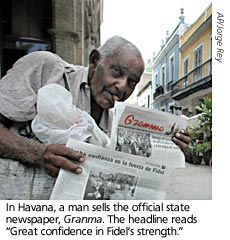New York, August 3, 2006—Cuban authorities on Wednesday turned back at least three foreign journalists seeking to enter the country to cover President Fidel Castro’s illness and handover of power. The Committee to Protect Journalists is troubled that the reporters were denied entry at Havana’s international airport.
“We urge Cuban authorities to allow journalists to cover this story of worldwide importance,” CPJ Executive Director Joel Simon said. “Authorities should immediately expedite journalist visas so the international press can report authoritatively on this historic moment.”
Mario Antonio Guzmán, a reporter for the Santiago, Chile-based Radio Cooperativa, told CPJ that he was stopped at 2:30 p.m. by airport authorities at Havana’s José Martí International Airport. Alvaro Ugaz, a journalist for the Lima-based Radio Programas de Perú (RPP), was also blocked, colleague Vanessa Ortiz told CPJ. Both journalists were traveling with tourist visas. Guzmán said several Cuban officials questioned them on the purpose of their visit and ordered them to leave on a plane to Panama, Guzmán told CPJ.
Juan Tamayo, chief of correspondents for The Miami Herald’s world desk, told CPJ that a reporter for the Miami-based daily was also turned back at the airport on Wednesday. Tamayo said that the journalist, whom he declined to name, requested entry on a tourist visa at Havana’s international airport but was turned back when he told authorities that he planned to report in Cuba. The reporter was rerouted to Panama.
Foreign reporters are permitted to work in Cuba only with special journalist work visas, which are granted at the government’s discretion.
Castro, 79, underwent surgery for intestinal bleeding, according to an official statement issued on Monday, but much is unknown about his illness—including the severity, prognosis, cause, and the hospital in which he is being treated. Castro handed power temporarily to his younger brother, Raúl, who has himself stayed out of public sight.
The Miami Herald reported that Cuban officials have repeatedly denied or failed to respond to foreign media requests for journalist visas to cover Castro’s illness and his handover of power.
The Cuban embassy in Santiago told Guzmán that processing a work visa for a journalist could take up to 21 days. The journalist decided to travel without a work visa because of the urgency of the story.
CPJ research shows that Cuban officials have historically granted visas to foreign journalists selectively, excluding those from media outlets deemed unfriendly. Cuban law further specifies that foreign journalists who travel to the country on a tourist visa “should abstain from practicing journalism.”
